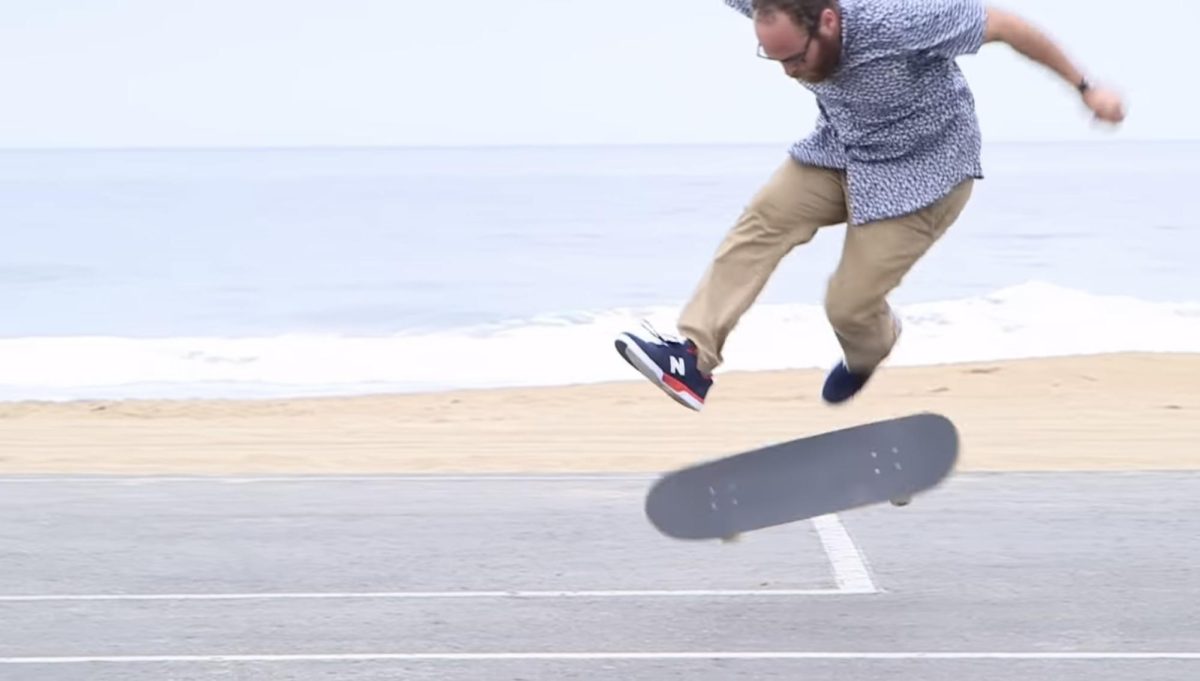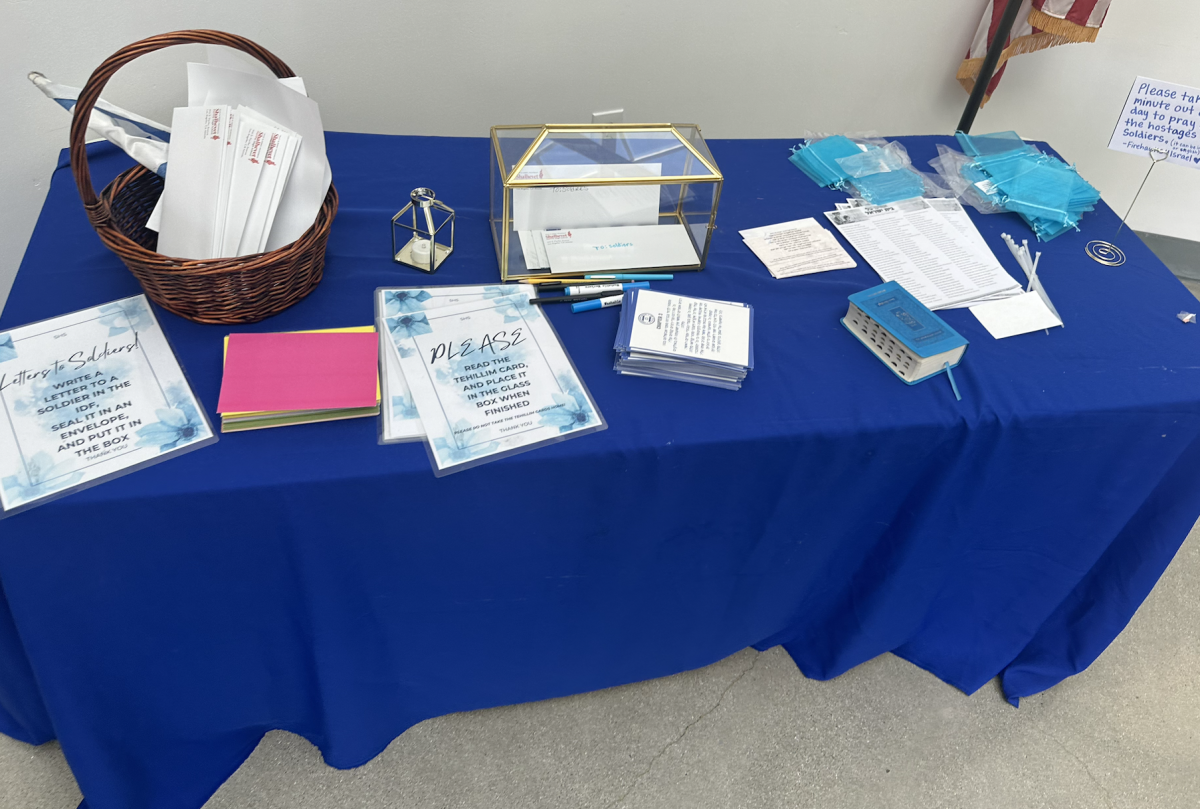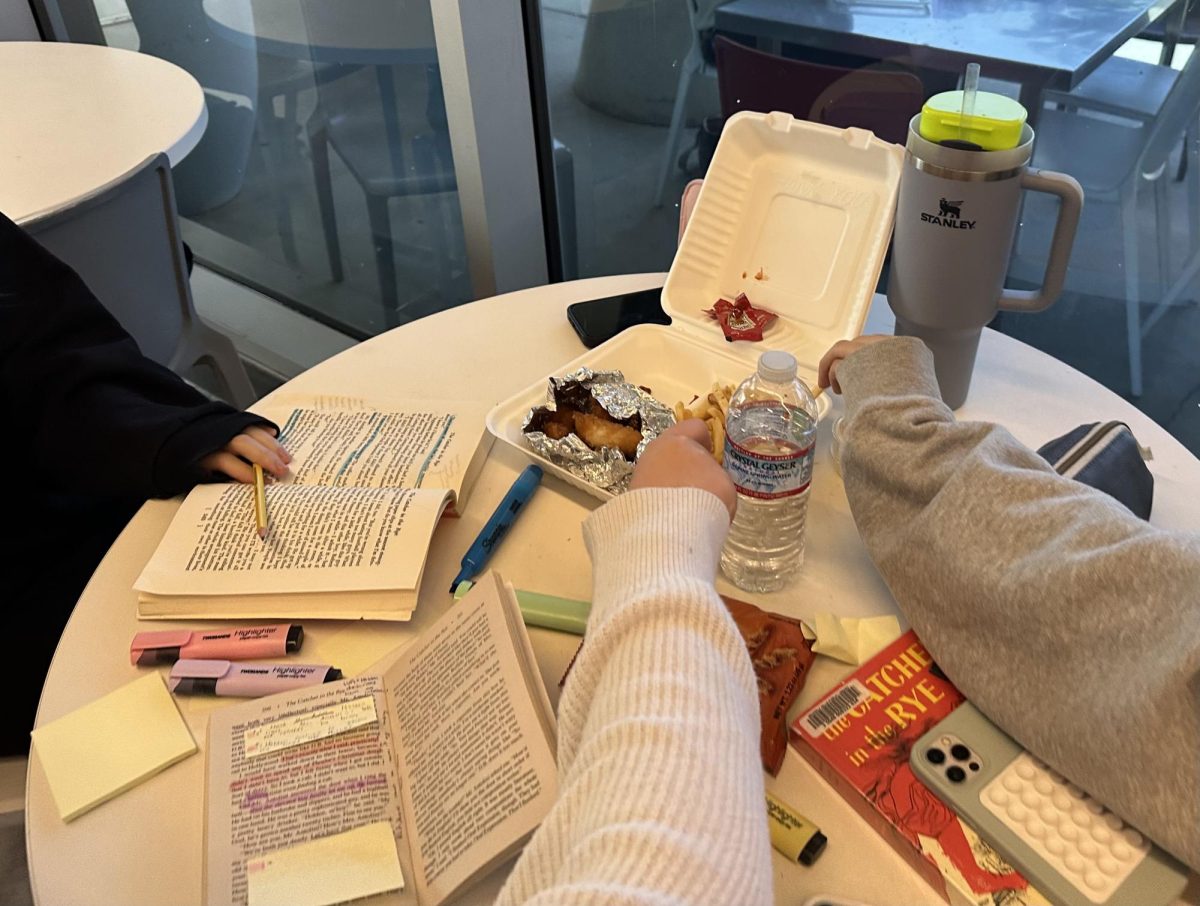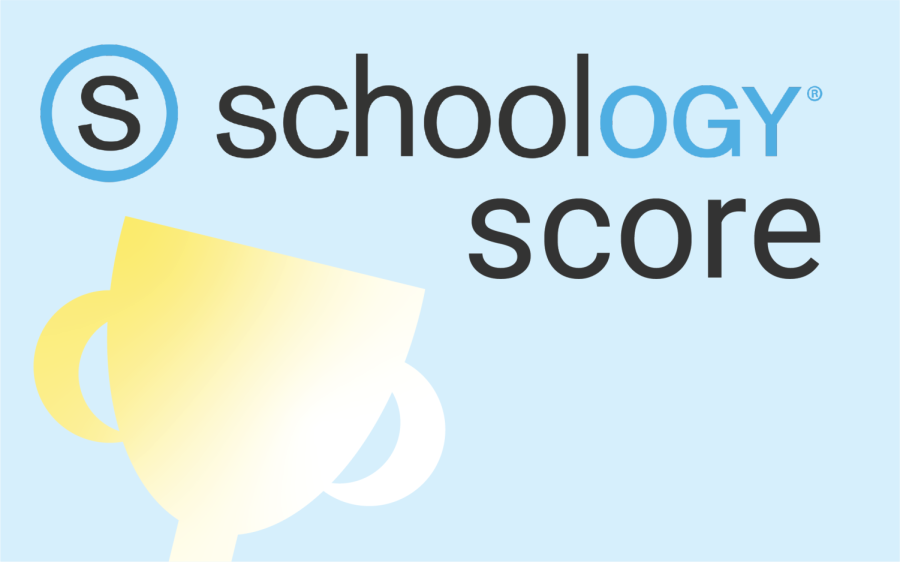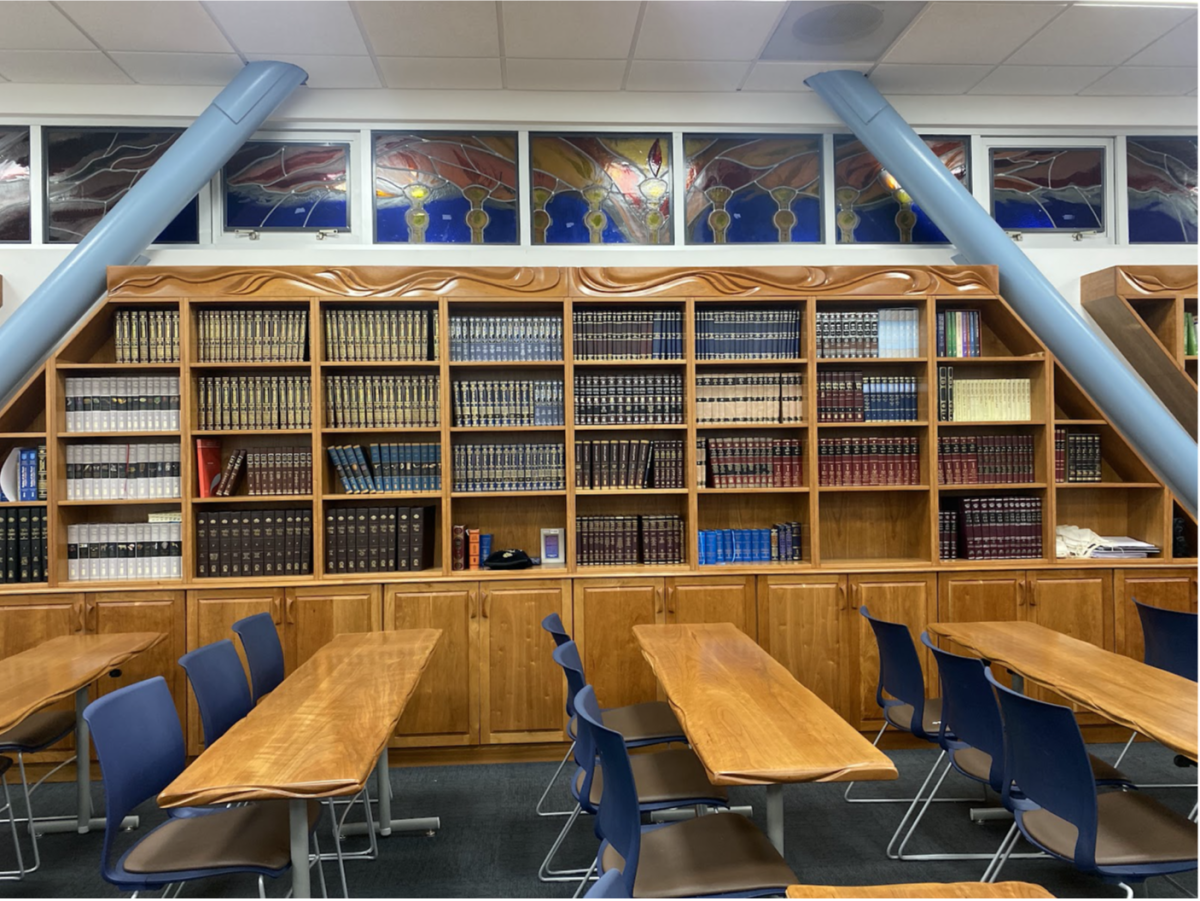Three current teachers at Shalhevet – Mr. Will Reusch, Mr. Justin Khalil and Dr. M. Keith Harris – all have used social media accounts to teach about their subject of interest beyond the walls of school.
Dr. Harris and Mr. Reusch, social science teachers, use Instagram, while science teacher Mr. Khalil has used YouTube. Dr. Harris and Mr. Reusch are still active, while Mr. Khalil has not posted a video in eight years.
All three said they’d found social media the most effective way to spread knowledge in this day and age, but also had experienced some of the hazards that come along with it.
“Social media is how we communicate,” said Dr. Harris, who teaches World History, Honors US History, SAS Civil War, and Topics in United States-History of LA (TUSHLA). “There are good parts about it and bad parts about it.”
Dr. Harris first downloaded social media in 2007 and made his first Instagram post on Feb. 2, 2013. He began by posting pictures of his cats, gradually evolving to pictures of himself and books he was reading. Recently, he has been posting videos about what he is reading along with little pieces of history.
“I think that a lot of people waste time on social media,” he said. “I think it can be a place that fuels hatred and polarizes people and communities. But it can be a great place where you can find people who want to have open conversations.”
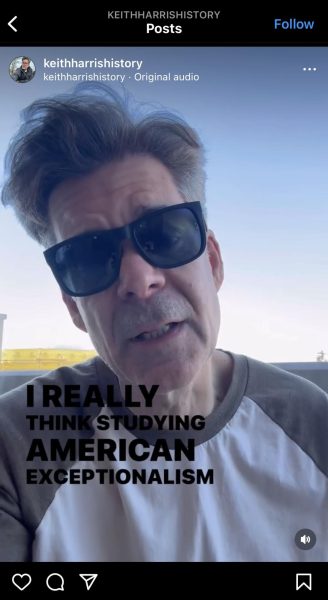
In a video about American Exceptionalism, one of his main topics, he describes its relevance in the classroom and in studying history.
“I really think that studying American Exceptionalism is vitally important to understanding the big events of American history, especially in the 19th century.” Dr. Harris says on the video.
Many of his other posts revolve around the Civil War, his main topic of interest and the subject of his popular SAS Civil War class. One recent post showed Midnight Rising, a Civil War book that he had been reading. In the description, he explains why he likes the book so much.
“This book is excellent,” said Dr. Harris on another post. “It complicates the story and reveals Brown as a multi-dimensional historical actor. As is typically the case, history is not so simple.”
Dr. Harris said it might be the best way to spread knowledge with everyone, not just people studying history in universities who might normally be the only people to receive this information.
“Social media is great because you can reach pretty much anybody in the world instantaneously, and have a live conversation,” he said.
“It’s my belief that history should be accessible for everyone, not just the educated elite, so when I speak about things, I don’t tend to use the academic language, I use the language of ordinary people.”
Mr. Reusch, who teaches Government and Economics along with Civics, made his first post on Instagram on April 21, 2018. From the start, he posted things similar to what he posts now, such as new ways to think about things, life skills, and occasional personal posts about his life and family.
“Teach students how to think, not what to think,” he says in a post from April 16 of this year.
He said social media helps him find ways to make people think about large issues such as classroom dynamics, and to challenge the way that others and also they themselves think about things.
“I talk about politics, religion – a whole bunch of things – trying to get people thinking,” he said. “The social media landscape is pretty gross, as far as sparking critical thought. So I try to be the change.”
Mr. Reusch said he often replies to others’ posts, and they sometimes respond by blocking him. That makes him think that many people posting online want their followers to stay ignorant.
“I’m finding myself in an echo chamber not of my own design,” he said of the Instagram world. “A vast majority of people have blocked me because of going into their comment sections and asking questions – because it seems to be that they don’t want the people in their account to be critical thinkers. They don’t want me to spark thought through questions. Questions are dangerous.”
Mr. Reusch portrays himself as the advocate for both sides of an argument to show people that either sides can look good or bad at different times. In a recent post, he shows himself speaking at an event, saying that many child predators were also abused as children.
“We’re not excusing the behaviors,” Mr. Reusch said. “There is nothing worse than ripping innocence away from a child. But they are created monsters, and we have to understand how these monsters are created. We have to get to know them if we have any hope of stopping this cycle of abuse.”
Mr. Reusch also believes that social media is destroying peoples’ mental health, in part because of the way that content creators purposely flaunt what they have gained from their successes that other people may not have.
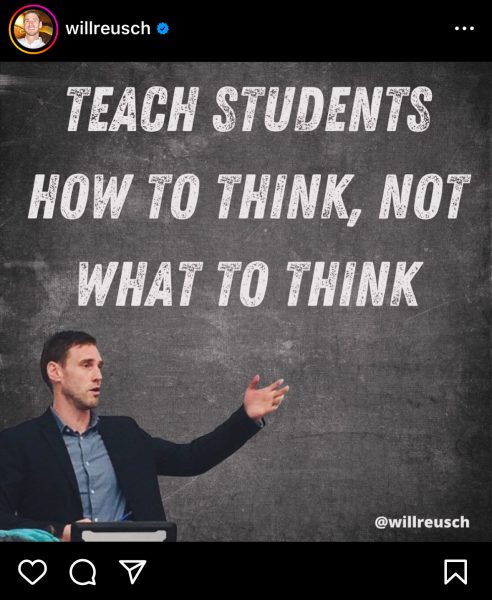
“I mean, if you’re doing this to give you quick, momentary comfort, you’re going to get long-term discomfort,” said Mr. Reusch. “It gives a quick dopamine hit and then it gives you long-term depression and anxiety because of what you don’t have.”
Mr. Reusch is leaving Shalhevet after this year to pursue starting his own online school. He said he dislikes formal classroom format and prefers to address each person’s needs, adding that this has kept him from fitting in with other educators.
I don’t like a lot of the school system,” he said. “Many places of learning are very standardized.”
He wants his new online school to be more interactive than schools typically are, believing that this will keep students engaged and will give them a broader sense of the topics.
“I want to scale up from what I’ve been doing at Shalhevet to more students with more diverse backgrounds,” said Mr. Reusch. “My goal is to give more options to people to show how they have digested the material, so when the assessment comes, they could write an essay, make a slideshow, a video.
“I also want to give options for how much — like every day, or once a week tutoring – just catering to every person’s schedule and needs.”
Mr. Khalil posted his first YouTube video on Jan. 6, 2015. He posted just five videos over the course of five months, until May of that year, making them on breaks from college with his friend’s camera. However, the flights home and producing the videos were expensive, and when expenses got too high to continue, he decided that he wanted to go into a more formal way of teaching.
“There are public misconceptions about certain topics in science that instantly make people shy away when most uses for them can actually be good,” said Mr. Khalil.
When he later became a classroom teacher, his goal was to combine teaching science with interesting and entertaining topics, using methods that he’d used on social media. He said that he was always better at teaching science than he was at studying and learning, and online content was a way to reach more people.
In a video he made about the physics of skateboarding, Mr. Khalil performs skateboarding tricks, first explaining the physics that make them work and then demonstrating. At the end of the five-minute lesson, he raps an physics explanation. He said it’s particularly helpful for people who struggle learning from textbook or notes.
As his rap put it, “See there’s so much to learn, out on the street see your feet makin’ twists and turns.”
When asked whether he plans to teach online again, Mr. Khalil did not dismiss the idea, but said that based on where he is in life, it’s a lifestyle that is behind him. He said he’s found a more stable living teaching than making content, especially because making money online is extremely difficult.
All three of the teachers agreed that social media can be used in a constructive way, to pass on knowledge and new thoughts. The vast majority of people who post online are not constructive in what they post, they said, and while there are a lot of people who do educate online, they are few and far between.
As teachers, they quickly became somewhat “odd people out” by using the platforms to teach while other people were trying to get likes and followers. Still, all three still believe there is value to be found in social media.
“It promotes short attention span and other things that are dangerous in the realm of education and can disruptive and distracting in class,” said Mr. Khalil.
“But it’s something that we can’t run away from and we’re going to have to embrace because that’s how everyone consumes information in the modern age. So we’re going to have to learn how to use it for good.”

